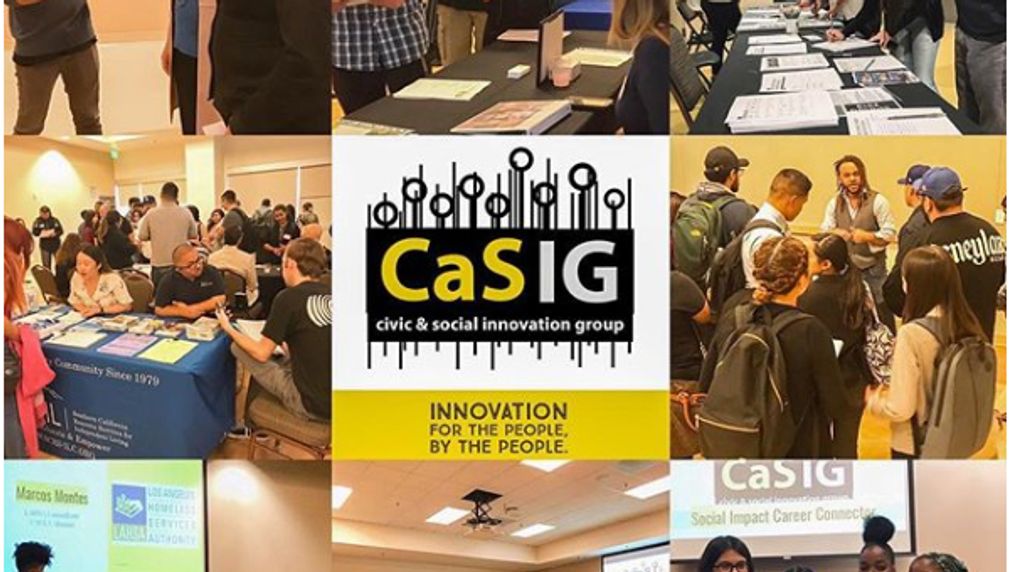Cal State LA's Civic & Social Innovation Group (CaSIG)
We propose the CaSIG Rooted Innovation Incubator (RII) as the vehicle to equip Cal State LA students to spark social enterprises and nonprofits throughout LA that facilitate economic opportunity and promote progress in a number of issues. The RII changes the game of social innovation for students who are intimately aware of their communities’ needs and opens doors for brilliant students who are under-resourced to develop their ideas and climb the economic ladder as they serve their communities.

Please list the organizations collaborating on this proposal.
Conaxion Inc.
Briefly tell us a story that demonstrates how your organization turns inspiration into impact.
The development of CaSIG on the Cal State LA campus is driven by stories like that of Conaxion. Formerly known as "Small Business Strong," Conaxion was the winner of the 2016 Mayor’s Cup, a social impact initiative introduced by Los Angeles City Mayor Eric Garcetti. The team comprised of undergraduates from Cal State LA across multiple disciplines including engineering, business and nutrition who took top honors for its idea for a mobile small business resource center housed in a van, which delivers mentorship opportunities and pathways to capital to under-served, underrepresented, and under-connected small business owners. Conaxion is now a fully operating 501(c)(3) nonprofit.
The Mayor’s Cup is a competition for young entrepreneurs at L.A. universities to pitch innovative solutions for tackling the city’s biggest challenges. Competitors were asked to develop ideas to address one of two issues: growing L.A.’s economy or civic engagement in neighborhoods. More than 100 teams applied, with graduate students from UCLA, USC and LMU competing in the final five.
Since Conaxion has won The Mayor’s Cup, they have inspired students campus wide to explore entrepreneurship in a socially innovative way. The University has further engaged Conaxion to provide mentoring to students participating in hackathons and business pitch competitions, helping them explore creative and efficient ways to start social enterprises.
CaSIG wanted to create more sustained and permanent opportunities within the campus for students across multiple disciplines that could help them achieve the success of Conaxion by connecting student’s classroom experience, intrinsic ingenuity and needs of their communities.
Which of the CREATE metrics will your submission impact?
Jobs per capita
Minority- and women-owned firms
Venture capital investment
In which areas of Los Angeles will you be directly working?
County of Los Angeles
City of Los Angeles
How will your project make LA the best place to CREATE?
Rooted Innovation Incubator (RII) builds on the success of the Civic and Social Innovation Group (CaSIG), which has helped over 500 students from a range of disciplines (most of them minorities) since 2017 to develop ideas for change, make personal connections with nonprofit leaders, and find internships and jobs— creating a strong base of applicants for the incubator. The RII also supports students through business pitch competitions where they are able to validate and evolve their ideas, while competing for seed money for their startup.
The RII will reside on the Cal State LA campus along with a satellite space at our partner organization— Conaxion, a nonprofit in South LA that focuses on economic development of small businesses. Students will learn the fundamentals of empathizing with their target audience, defining a problem and ideating a solution at Cal State LA. Conaxion will help students build out their solution with prototyping and gamification tools (e.g. 3D printers & pens, applications) using a human-centric approach to test products, and iterate once more before going to market.
The Cal State LA community is bordered by four low-income, predominantly Hispanic neighborhoods: El Sereno, East Los Angeles, Lincoln Heights and Boyle Heights. These communities represent part of the 86% of Cal State LA students who come from Los Angeles County. In fact, 87% of the students apply for financial aid and nearly all are granted need-based aid, reflecting the surrounding low-income communities. Furthermore, over 60% of the 29,000 student population is Hispanic, thus explaining the University’s Hispanic Serving Institution status. By expanding the current programming of CaSIG with the addition of the RII, it will directly impact the all the communities that our students represent.
Academic YR1 Aims:
-Recruitment of first cohort to go through intensive business ideation led by Cal State LA main location;
-transition at least half of the initial cohort to go through the next phases leading to launch, which would be led by Conaxion;
-continue working with the remaining part of the ideation students to help them strengthen their ideas in preparation to transition to Conaxion.
Academic YR2 Aims:
-Launch students from accelerator to market;
-transition remaining first cohort to accelerator;
-recruit for second cohort;
-start second round of ideation intensive led by Cal State LA location; transition second ideation cohort to incubator;
-launch remaining students in cohort to market.
This Incubator in collaboration with Cal State LA and Conaxion will be a quintessential vessel for developing the brilliant minds of minorities— solving problems that they are currently facing in their community. While supporting these entrepreneurs, we will track impact by measuring jobs created, number of women and minority owned businesses created, capital investment and give people a reason to reside in Los Angeles to grow their business after graduation.
In what stage of innovation is this project?
Post-pilot (testing an expansion of concept after initially successful pilot)
Please explain how you will define and measure success for your project.
300 students participating in pre-incubator training workshops within the first 1.5 years of operation
20-40 students launching 5-10 ventures through the incubator by the end of year 2
Formal establishment of 10 social enterprises within the first 2 years, 100% led by women founders and/or founders of color
Obtain venture capital investment of $250,000 across all businesses